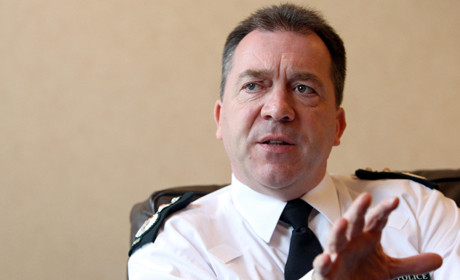|
Former chief constable of Leicestershire police said a 'greater
understanding of the complexity and consequences of speculation' should
be learnt from the McCann case
|
 |
|
At the time Baggott said he wrote two letters
to the press calling for 'restraint'
Copyright: Paul Faith/PA Wire
|
The former chief constable of Leicestershire police, now chief constable
of the police service of Northern Ireland, today said that "speculation"
in the UK press did "hinder" the inquiry into the disappearance of
Madeleine McCann.
The inquiry was told that the Leicestershire force, covering the
McCann's local area, was "asked to co-ordinate the UK response to assist
the Portuguese enquiry".
In evidence to the Leveson inquiry chief constable Matt Baggott told the
court the force received complaints about press behaviour "around
disruption to daily life caused by a large media presence".
Baggott said he wrote two letters to "all the prominent editors" calling
for "restraint in reporting on the case".
In the letters he wrote he had "been surprised at the reporting of some
alleged facts" and was "deeply concerned at the implications".
He added that the reaction was "not hugely positive" given that
"speculation continued".
Baggott also told the inquiry "there could have been a greater authority
to explain the boundaries of what that press reporting should have
been".
"The difficulty was it involved a European dimension as well as a
national one. But there could be stronger guidelines and consequences."
He added that the speculation occurring in areas of the press "certainly
hindered the inquiries to find and trace Madeleine simply because of the
reaction that came from the media speculation".
Giving evidence to the Leveson inquiry last year the parents of
Madeleine McCann said they were "tried by the media" in the wake of her
disappearance.
They also spoke about a "tremendous amount of speculation", with
coverage becoming often "exaggerated" and other reports being "simply
made up" and "inaccurate, untruthful and incredibly damaging".
Asked what lessons could be learnt from the McCann case, Baggott today
said while the inquiry is ongoing "the lesson to be learnt is probably a
greater understanding of the complexity and consequences of speculation
and loose reporting of facts".
"That is a serious issue for the press to consider", he added.
"I don't think some of this speculation was necessary ...it certainly
wasn't practical and it certainly wasn't proportionate.
"... A greater understanding of consequence would have been
appropriate."
Speaking more generally about police officers disclosing information he
said there is a need for a "balance" to be found "between giving local
colleagues the ability to storytell with the right ethical guidance and
support, which is entirely appropriate, while making sure the very real
issues of the inappropriate use of information, whether that's for
personal gain or through gossip still remains under tight control".
"Our relationships with the media probably need to be reasserted based
on what the man or woman on the street would think."
He added: "It should be amicable and it should be very friendly, but it
should always professional and for a purpose |


